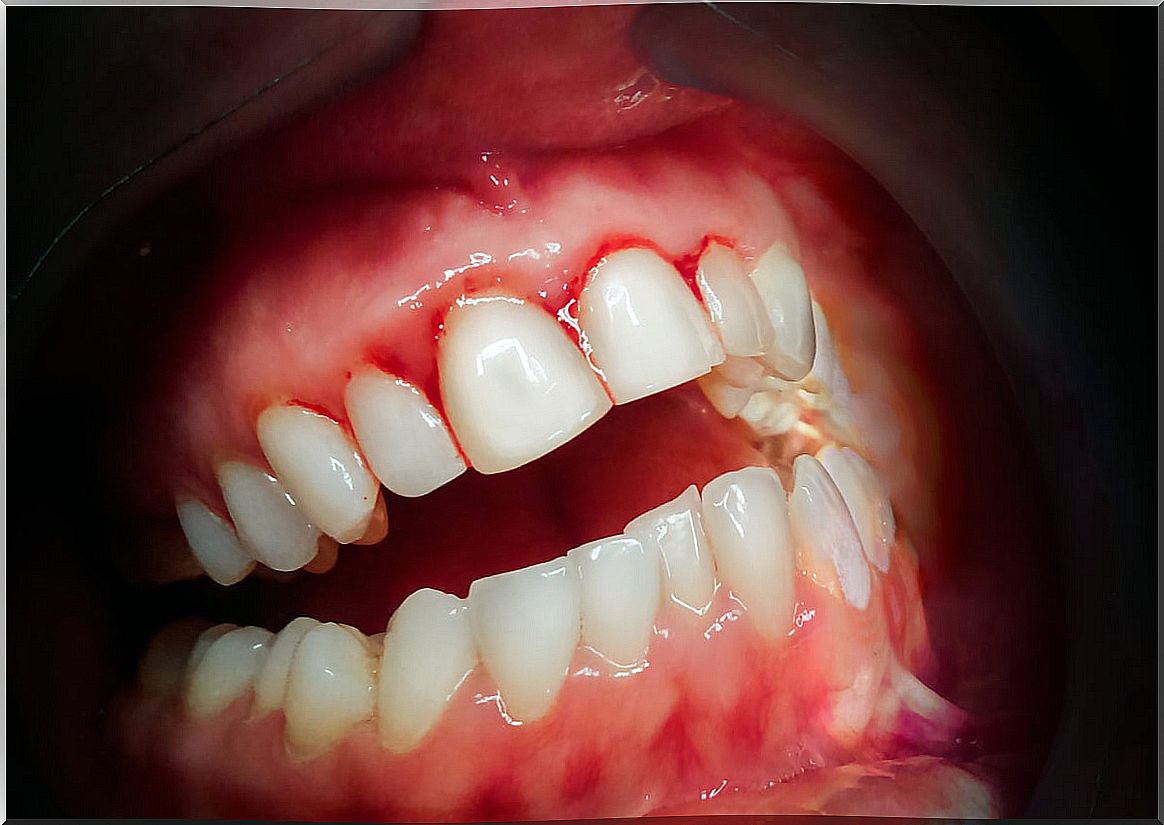What Should You Know About Dental Implant Complications?
Although the techniques are becoming more and more precise, there are complications from dental implants. These are metal posts that are surgically placed into the jawbone to fuse to the jawbone and support an artificial tooth.
In general they have a high success rate, but there may be immediate failures to the surgeries or they may occur months or years after the intervention. Here we will tell you some of the problems that can occur when placing an implant, how to avoid them and the alternatives to recover your smile when this technique is not viable.
What factors influence the success of dental implants?
There are several factors that determine the success of dental implants. Here we mention some:
- Smoking – This habit decreases blood flow to the gums, making healing difficult. The bibliography speaks of a failure of up to 20% in smoking patients.
- Insufficient maxillary bone: a good layer of healthy bone is necessary to support the implant. The surgeon must ensure that there is sufficient bone tissue, without alterations and with the appropriate thickness. Osteoporosis or gum disease can affect bone density, making them more fragile. Also if the patient received radiotherapy in the area. Anyway, today there are filling techniques that can reverse this condition.
- Gum disease: swollen or actively infected gums should be treated before an implant is performed. The gums must be healthy at the time of surgery to avoid complications.
- Medical conditions: pre-existing systemic alterations suffered by the patient and that alter the healing process can interfere with the osseointegration of the implant. Diabetics, autoimmune patients or those with rheumatoid arthritis are more likely to have a failure in these treatments.
- Medication: some medications can interfere with the integration of the implant into the bone. It is important to mention to the surgeon all the treatments that are performed regularly to avoid complications.
- Poor oral hygiene: poor oral cleaning will interfere with the success of the implant. The patient receiving an implant must commit to keeping their mouth thoroughly clean.
The role of the surgeon
Surgery with a trained professional can prevent certain mistakes that an inexperienced hand can make. It is important to ask for opinions, ask questions and find someone with a lot of experience in the field.
In addition, a correct and exhaustive treatment plan will be able to avoid later complications. The dentist will need to perform a complete examination of the entire mouth and take radiographic images of the mouth. The health of the gums, bone and oral hygiene will be assessed. Consideration should be given to the patient’s general health, past illnesses, and the medication he is taking. This will help to define if the person is a candidate to receive the implant in their mouth or if some previous adjustments are necessary.

Early problems and failures of dental implants
Early failures are those complications of dental implants that occur during implant insertion or immediately. In general, those problems that occur within the first three months of the procedure are included as early. Here we discuss the most common ones.
Pain
After surgery, it is common to feel discomfort, swelling and some degree of pain in the area. Even the surgeon dentist will indicate to take painkillers to facilitate recovery.
The process of integrating the metal from the implant into the bone takes between three to six months to complete. It is common to feel some discomfort in this period of bone healing. But if the pain is intense and persists after five to seven days, the surgeon should be consulted.
Infection
An infection may appear in the implant area. Signs such as swelling, pain and suppuration make it necessary to go to the dentist to treat it.
Poor dental hygiene, autoimmune diseases and smoking predispose to its appearance. To avoid them, it is vital to comply with the postsurgical indications.
Your specific treatment will depend on the location, severity, and type of infection. If, for example, it is a bacterial infection of the gum, antibiotics or a soft tissue graft are usually sufficient.
If, instead, the affected tissue is bone, it may be necessary to remove infected bone tissue along with the implant. After treatment, the area must be reconstituted with bone and soft tissue grafts.
Implant micro movements
When the dental implant lacks stability, it may have slight movements. It happens when the implant is placed at the same time as tooth extraction and occupies the space of the extracted tooth.
Also these complications of dental implants usually happen when placing the artificial crown early. By not waiting long enough for it to integrate into the bone, an overload is generated that leads to this failure.
Insufficient bone support
This complication of dental implants happens when there is not enough bone to support. If the bone thickness or quality are not adequate, it cannot be integrated into the maxilla. These are generally due to a fault of the surgeon who did not take this factor into account or performed the procedure anyway.
Loose dental implant
As we already mentioned, for this technique to be successful it is necessary for the implant metal to be integrated into the jawbone. This process of fusion between metal and bone is called osseointegration and lasts for several months.
In those cases that this does not happen, the implant will be loose. It will move and the dentist will have to remove it. Placement may be attempted again once the area has healed.
Gum recession
The gums around the implant may begin to recede, causing inflammation or pain. It is important to consult the dentist before any change that is noticed in it.
Allergic reaction
Some patients may develop an allergy to the implant metal, which is titanium. There will be swelling of the area, a tingling or cramping sensation and loss of taste.
If the patient knows that he is allergic to titanium, he should mention it to the surgeon to use an implant made of another material. Although in most cases the person does not know that he suffers from this hypersensitivity.

Delayed dental implant failures and problems
Complications from dental implants may not occur immediately after dental surgery. But after several months or even years, failures are a probability. Among the most common we have the following:
- Damage to nearby nerves: During surgery, the dentist may place the implant very close to a nerve. This will cause pain, tingling, numbness, tingling, or burning of the skin, lips, gums, and face.
- Damage to the paranasal sinuses: when the implant is placed in the upper jaw, it may protrude into the paranasal sinuses and cause sinusitis. This is the inflammation of these cavities. The patient will have swelling or pain in the area of the cheeks, forehead, head, eyes and teeth. In addition, you will have a stuffy nose, green or yellow nasal mucus, decreased smell, and bad breath. It can also present with a fever. In the event of any of these symptoms after the placement of an implant, it is necessary to go to the surgeon immediately.
- Complications of dental implants due to excessive force: if the implant receives a blow, stress or very strong impacts, it can happen that it becomes loose or cracked. Bruxism and dental clenching cause this failure. In these cases it is necessary to complement the treatment with a mouth guard.
- Foreign body rejection: It is one of the less frequent complications of dental implants, but it can occur. The body rejects the implant. There will be pain and swelling in the area, fever, and chills.
- Peri-implantitis: it is a chronic disease of the gums that surround the implant, causing the loss of the bone that supports it. It may appear up to 5 years after the material has been placed.
There are also complications of mechanical dental implants, such as the breakage of the implanted screw or the artificial tooth. To avoid them, it is important to continue with adequate oral hygiene that keeps the gums healthy. Regular check-ups with the dentist will also make it possible to detect any problems early.
Symptoms of dental implant failure
You should pay attention to certain signs that appear when there are complications from dental implants. The most frequent are the following:
- Inflammation of the gums or recession of the same.
- Constant pain in the area.
- Swelling in the implant area.
- Difficulty chewing.
- Hemorrhage or bleeding at the implant site.
- Suppuration in the surgical area.
- Loose or moving implant.
- Bruising or swelling of the gum or skin.
- Tingling, tingling or paresthesia sensations.
In the event of any of these symptoms or other doubts you may have after placing an implant, consult your dentist soon. Fixing these faults in time will improve the prognosis.
How to prevent dental implant complications?
Although there are complications of dental implants that we cannot avoid, considering some measures we can reduce the risk of failure. It is important to take this into account and respect the advice given by the dentist.
After surgery, the surgeon may advise you to rest well, avoid strenuous exercise, and follow a cold, soft diet for a few days. Placing cold in the area and the use of anti-inflammatories may also be suggested to reduce postoperative inflammation.
Implant care is vital to the success of the procedure. Brushing, flossing, and mouthwashes are necessary to keep them healthy. Regular dental check-ups are also needed. Unless the dentist indicates to attend more frequently, a visit every six months is opportune.
You have to avoid smoking. Preferably, eat foods rich in calcium such as dairy, oranges and broccoli or supplements that provide this element. It may be necessary to use a mouth guard to treat bruxism and prevent occlusal overload of the implant.
Alternatives to dental implants

Although they have several advantages, we have seen that there are also complications from dental implants. This procedure is not suitable for everyone, but fortunately there are other alternatives to recover the lost smile.
Dental bridges are an option. It is a fixed prosthesis that is used to fill the spaces generated by missing teeth, using the healthy dental elements that remain in the mouth as support.
There are different types of dental bridges:
- Maryland or bonded resin bridge: it is an artificial tooth with extensions on the sides (like wings) that support and adhere to the healthy teeth neighboring the space left by the missing element. It does not require much wear on the remaining teeth, but it cannot withstand enough chewing force.
- Traditional: it uses the neighboring teeth on both sides of the space left by the missing teeth as support and support. These remnants wear out and receive crowns that support the artificial ones that replace the lost elements.
- Cantilever: similar to the previous one, but with the difference that false teeth are supported by a single healthy element. The crown that supports the bridge will be one.
Another alternative to replace missing teeth is the use of removable dentures. These can be partial if they replace one or more dental elements or complete if they replace all the teeth in the mouth.
Dentures consist of fixing one or more teeth to an acrylic base of the same color as the gum that sits in the mouth as a retention tray. Some are attached or have hooks to increase your support. They are a cheaper alternative to dental implants.
Complications of dental implants can be avoided
You will likely not suffer complications from dental implants if you have one, as they have a high success rate. But it is good that you know that there are failures, to prevent them.
You already know how important it is to find a specialized and experienced dental surgeon to perform implants. Avoiding smoking and good oral hygiene will be key to avoiding problems and being able to recover your smile.









